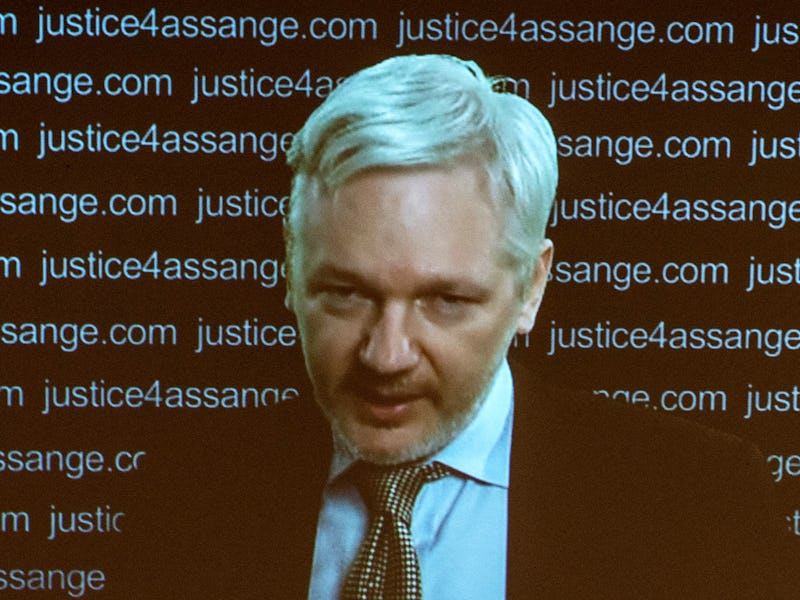UN: Wikileaks Founder Julian Assange Illegally Detained by U.K., Sweden
He's still not going anywhere.

A United Nations legal panel ruled this week that the countries of Great Britain and Sweden have been arbitrarily detaining Julian Assange, the founder of Wikileaks, and should not only allow him to go free but compensate him for the time he has spent in the embassy.
Assange has been living in Ecuador’s Embassy in Great Britain for three and a half years to avoid extradition to Sweden where he is suspected of rape. Ecuador granted him asylum in 2012.
The “moral recommendation” from the UN panel, announced today, does not carry the force of law, and the governments of Great Britain and Sweden immediately denounced the ruling.
“#Assange is a fugitive from justice, voluntarily hiding in the Ecuadorian embassy. I reject the report from #UNWGAD,” wrote Philip Hammond, the UK’s Secretary of State for Foreign & Commonwealth Affairs, in a tweet about the report.
Assange “has never been arbitrarily detained by the UK,” a UK Foreign Office spokesperson told the BBC, adding “He is, in fact, voluntarily avoiding lawful arrest by choosing to remain in the Ecuadorean embassy,” as he is the subject of a legally binding European arrest warrant.
But it’s really not that simple, Assange’s lawyers say. Sure, Assange could leave and be sent to Sweden to address the rape allegations, which they also reject as frivolous. But what happens when he is in custody, and the United States seeks his extradition to America to face charges that would undoubtedly threaten him with a lengthy prison sentence and maybe even the death penalty?
A panel of WikiLeaks representatives and press look on as WikiLeaks founder Julian Assange speaks at a press conference at the Frontline Club via video link from the Ecuadorian Embassy in London on Friday in London. Assange's speech comes a day after it was announced that the UN panel ruled he was being unlawfully detained at the Ecuadorian Embassy.
The UN panel agreed, arguing that the United Kingdom was facilitating the extradition of Assange to the United States, where he would face criminal charges “for the peaceful exercise of his freedoms.”
WikiLeaks has released hundreds of thousands of secret government documents from nations around the world, including many thousands from the United States. The documents include diplomatic correspondence, military records, and memos that contain records of possible war crimes during the wars in Afghanistan and Iraq.
While many people praise Assange as a kind of facilitator for whistle-blowers, someone who helps people to reveal dirty government secrets, governments often see it differently. Just one Wikileaks source, Chelsea Manning, received at least 35 years in prison for passing secret documents in her role as Army intelligence analyst. Manning had been charged with “aiding the enemy” which could entail the death penalty, but the court acquitted her on this count.
Supporters of Assange are already pointing to the rejection of the UN ruling by the United Kingdom and Sweden as another example of hypocrisy from the world’s wealthy and powerful.
“This writes a pass for every dictatorship to reject UN rulings. Dangerous precedent for UK/Sweden to set,” wrote Edward Snowden on Twitter.
“Ignoring the UN verdict on Assange gives dictators a free pass to ignore the UN. Continue to put pressure on the UK and Sweden,” posted @YourAnonNews, a high-profile Twitter account for hacking collective Anonymous.
Members of the media work outside the Ecuadorian embassy where Wikileaks founder Julian Assange continues to seek asylum following an extradition request from Sweden in 2012, on February 5, 2016 in London. The United Nations Working Group on Arbitrary Detention has insisted that Assange's detention should be brought to an end.
Shortly after the ruling Assange, in a videoconference with media, denounced the United Kingdom’s response to the UN ruling and said that he was still not planning to leave Ecuador’s Embassy.
“Today, that detention, without charge, has been found by the highest organization, the United Nations to be unlawful” he said, adding that “The working group is the world expert body in understanding the law of when someone is to be detained or not detained.”
So the ruling may not change Assange’s housing situation, but it’s a small victory in his fight to free himself and the world’s secrets.